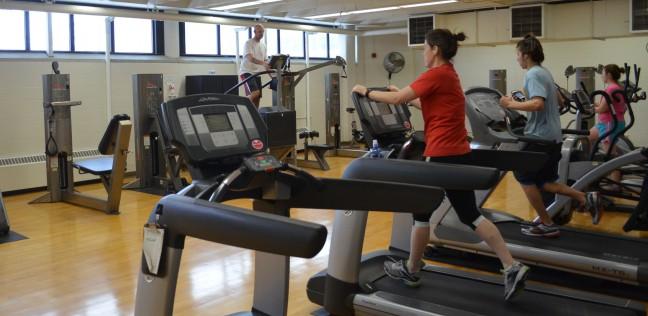University of Wisconsin Recreation & Wellbeing is offering virtual personal and small group trainings, allowing students to stay active while maintaining social distancing guidelines.
The virtual training sessions are available over Zoom, Facetime and Skype. Coordinator of Fitness at UW Recreation & Wellbeing Xzaveion Price said these opportunities allow students to stay active while keeping safe.
“With these virtual services, a student can gain all of the benefits of a strategic and progressive exercise plan from the safety, convenience and comfort of their home,” Price said in an email statement to The Badger Herald.
UW Recreation & Wellbeing offers two different online training services — virtual one-on-one sessions and a Personalized Fitness Program.
The one-on-one sessions allow trainers to coach, motivate and cue individuals throughout their personally designed program, according to Price.
“The Personalized Fitness Programming Pass is the newest and more unique of our services,” Price said. “Your trainer will program workouts for you based on your goals, space and the equipment available to you.”
Individuals complete these workouts on their own time without a trainer present and check-in with their trainer virtually to talk about their progress, Price said.
The positive mental health effect of physical activity is one of the large motivators encouraging students to stay active — a University of Wisconsin study found higher levels of physical activity associated with positive mental health, with lower levels of physical activity associated with lower levels of mental health.
UW School of Nursing assistant professor Traci Snedden led the study and talked about some of its significant findings with The Badger Herald after it was published.
“Most importantly, [these results] emphasize the positive relationship between physical activity and overall mental health,” Snedden said in the article.
Price also said physical activity has positive mental health benefits, especially during the time of pandemic.
An Iowa State University study found Americans are exercising less frequently than usual and spending an increased amount of time on screens during the pandemic. The study also found the decreased activity and increased screen time resulting from COVID-19 restrictions aligned with deteriorating mental health.
“We have learned how easy it is to become increasingly sedentary during the pandemic since many of us don’t need or have to leave our homes anymore,” Price said. “It is essential for our mental wellbeing as well as our physical well being that we find ways to move and enjoy ourselves.”
UW junior Leslie Olson tries to stay physically active 4-6 days a week, depending on school and other priorities.
Olson recognized the connection between physical and mental health, Olson said.
“I think that sometimes we think of the two, physical health and mental health, as two separate entities, but they’re very much interconnected,” Olson said. “When your mental health is declining, it’s harder for you to get out and do physical activity.”
According to Mental Health America, the human body is interconnected and as such, it’s important for people to take a whole-body approach when trying to improve their health.
For example, those who increase their physical activity while tackling their negative thoughts can improve their quality of life, according to Mental Health America.
Olson uses exercise to help her mental health and said she feels better mentally after being physically active.
“I’ve always been drawn to physical activity so if I wasn’t able to be physically active and I didn’t have the tools or resources, I think I would be much more anxious and depressed,” Olson said.
UW senior Hailey Birch also said she believes physical activity has a positive impact on her mental health. Because of this, she said she aims to exercise four to five times per week.
Birch is a certified personal trainer and working at Kamps Fitness in Madison has allowed her to help others to stay physically active too, according to Birch. This position additionally helps her stay active while benefiting her own mental health.
“Exercise is a mental escape where I don’t have to think about anything else, and it has significantly improved my stress and anxiety,” Birch said in a written statement to The Badger Herald.
Physical activity provides a valuable stress release and form of escapism, according to American Addiction Centers. Releasing stress through sports additionally prevents people from diverting their stress to less appropriate places.
Aiming to provide good physical and mental health services for students is one of the main goals of UW Recreation & Wellbeing’s virtual training programs, according to Price. Students can get involved with either of these programs by filling out interest forms on the UW Recreation & Wellbeing website.
“We want to provide every opportunity to the Badger community to get fit and live well,” Price said.


